From Shock Trauma to Keedysville, crash victim's recovery inspires 'awe'
"Grateful and blessed."
Those are the first words Keedysville resident Scott Spitnale said come to mind when he thinks of his wife, Laura, and all the emergency workers, from the Washington County 911 call center to the University of Maryland R Adams Cowley Shock Trauma Center.
That includes the witnesses who called 911 and his wife from the scene of the June 23, 2021, crash, after a car turning left hit his motorcycle head-on at the intersection of Md. 67 and Garretts Mill Road in southern Washington County.
It also includes the local EMS workers who responded to the scene, Maryland State Police aviation who flew him from that intersection to the rooftop at Shock Trauma in Baltimore, the medical professionals who worked on him immediately and in the ensuing weeks, and the folks at the University of Maryland Rehabilitation & Orthopaedic Institute who helped Spitnale rehab for nine weeks on and off. And many others who have helped him with rehab, making his home handicap accessible and more.
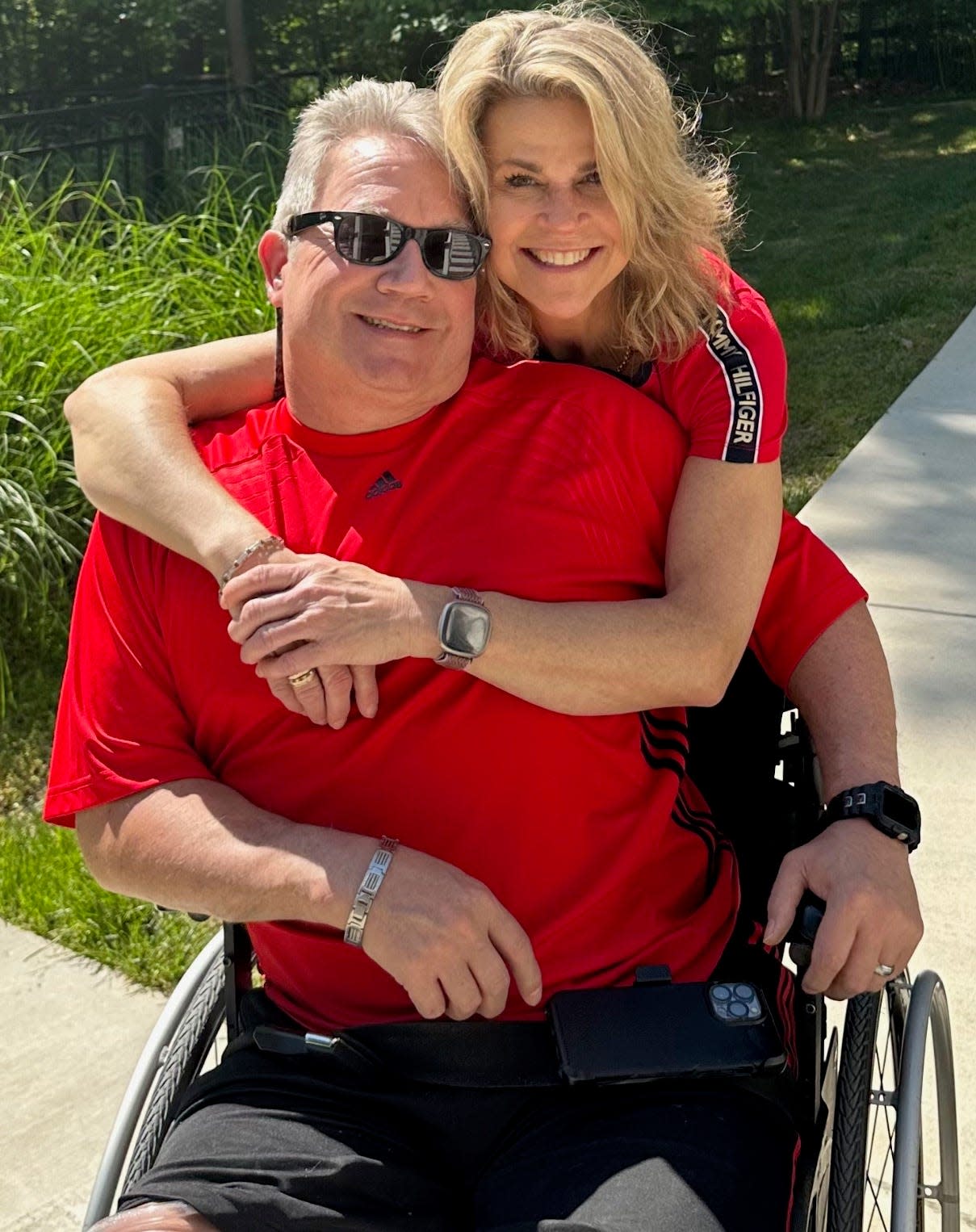
Spitnale's case was one of two highlighted last weekend during the 33rd annual Shock Trauma Heroes Celebration at the Joseph Meyerhoff Symphony Hall in Baltimore.
Spitnale, now 59, has had at least 20 surgeries — including having his right leg amputated above the knee — and is paralyzed from the waist down.
Despite the traumatic injuries and long recovery, he has a positive attitude and encourages everyone to "live life to its fullest, 'cause you're not guaranteed tomorrow."
If you have an opportunity to call your loved ones, "get over that grudge, be a better person and make amends because life can be cut short in an instant," he said.
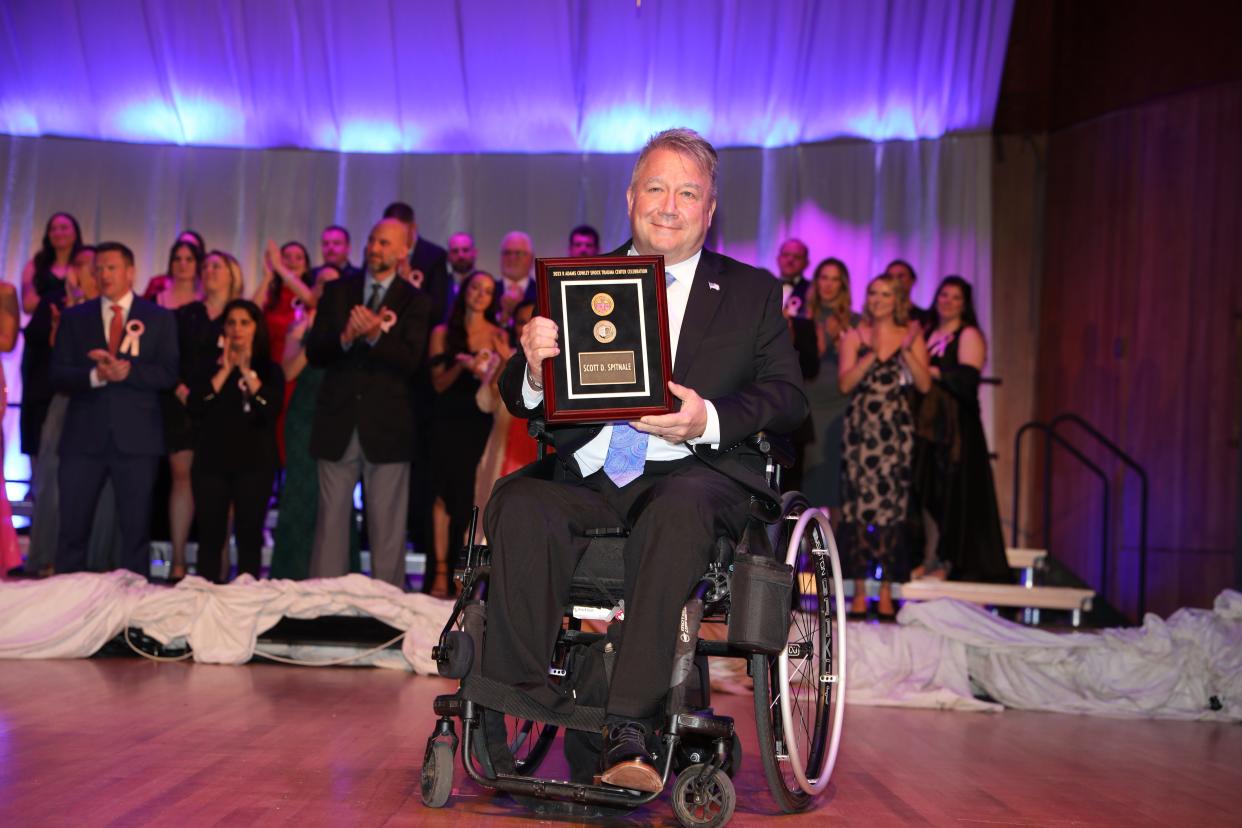
During the ceremony, Scott and Laura reconnected with some people from the university's medical services and met for the first time some of the local EMS workers who stabilized Scott, keeping him alive to put him on state police's Trooper 3 helicopter to get him to the only integrated trauma center in the country, in Baltimore.
This past week, local EMS professionals and Dr. David T. Efron, chief of trauma and Shock Trauma's medical director, talked about what a miracle it is that Scott is alive and doing so well after such traumatic injuries, as well as the system working the way it should that day.
Capt. Keli Smith, a Washington County Division of Emergency Services EMS supervisor, said after 20 years in EMS in the county, including five years as a medical examiner, her gut told her that June day that Scott had a 50/50 chance.
"When it came down to it, we got him to where he needed to be, but (Scott) and Laura have done all the hard work," Smith said.
"Every aspect of the system worked," including the early recognition of the severity of the injuries and referral to Shock Trauma and the treatment provided in the field, said David Chisholm, deputy director of operations for the county's Division of Emergency Services (DES).
"It's nothing short of a miracle, hands down," Smith said.
'One of the longest rides … of my life'
Scott Spitnale said he finished his Department of Homeland Security shift that Wednesday afternoon and decided to run to the newer Weis Markets in Brunswick, Md., to get some veggies and kielbasa to grill for dinner for himself and Laura, his wife of 6 1/2 years at that time.
"I was going to whoop it up on the grill. ... I love to grill for my wife. We like to hang out. She's my best friend," Scott said Friday in a phone interview.
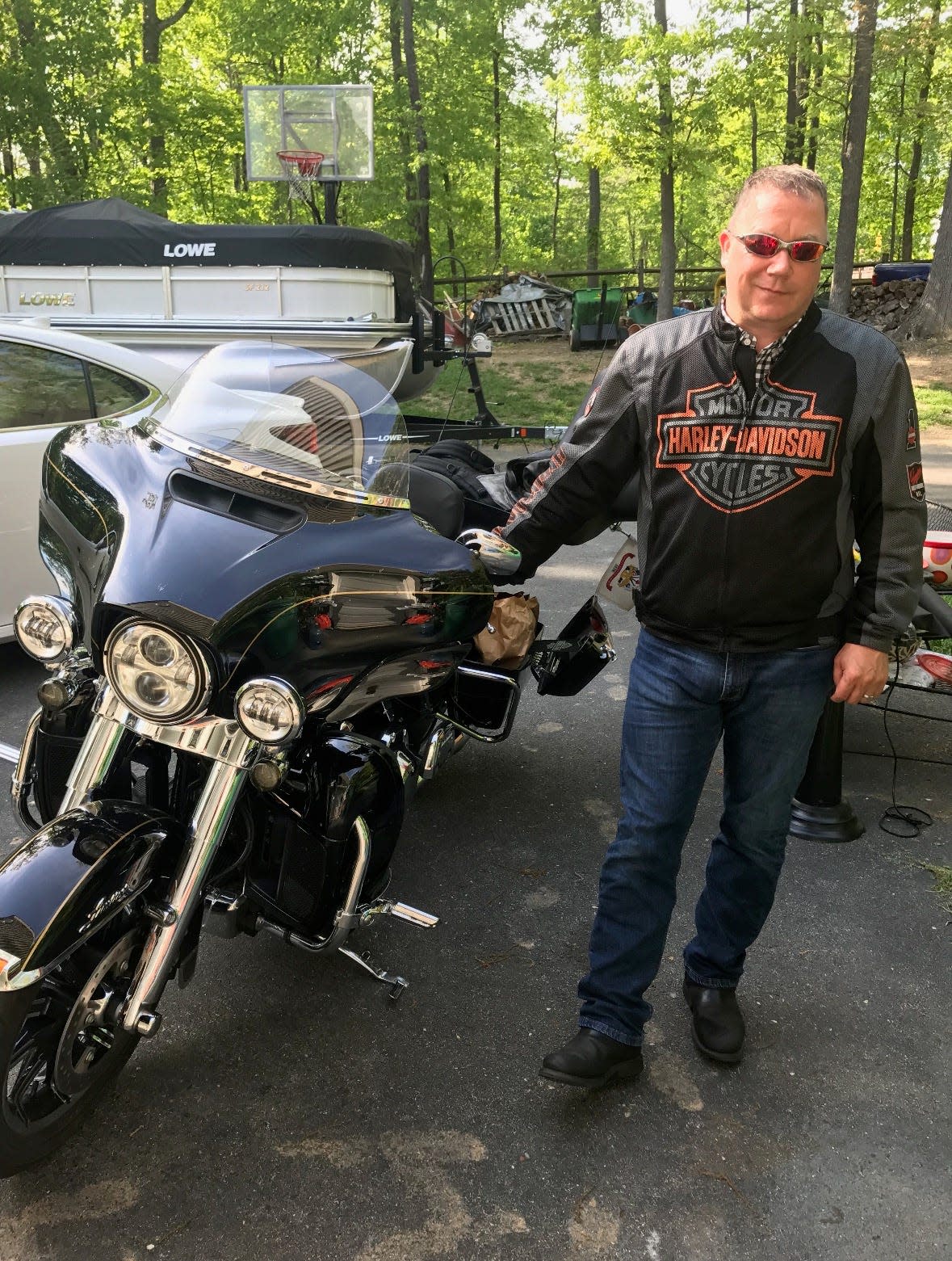
"That turned into one of the longest rides ... of my life," Scott said.
He doesn't remember the impact.
According to state police at the time, a motorcyclist was seriously hurt in a crash at Garretts Mill Road and Rohrersville Road (Md. 67) shortly before 4:30 that day. Spitnale, riding a Harley-Davidson motorcycle, collided with a Honda Accord that pulled in front of him from Garretts Mill Road, police previously said.
Spitnale was airlifted to Shock Trauma.
That's the short version.
What we know from Washington County District Court records and the case docket is that a woman who lived in the area at that time pleaded guilty on Aug. 24, 2022, to turning left and failing to yield the right-of-way to a vehicle approaching from the opposite direction.
The woman, then 49, was ordered to pay Spitnale $750 in restitution and was put on unsupervised probation for a year in the traffic case.
Calling early for a medevac
At the time of the crash, firefighter/medic Adam Carrier had 17 years in fire and EMS experience. Carrier and his career colleague, EMT/firefighter William "Chip" Rentzell were working that day for DES, stationed at 1st Hose Co. of Boonsboro's Rohrersville station.
They were both hired under a federal SAFER grant that allowed county government to supplement volunteer fire and EMS with paid professionals stationed at fire halls in various parts of the county.
Along with two volunteers, Carrier said he and Rentzell got the dispatch call for the crash and boarded a fire engine. The engine, like the fire station, has a computer screen on which responders can see information about the emergency call.
Looking at the notes on the engine laptop and seeing the severity of injuries described, Carrier said he checked to see if a state police medevac was available and when he learned it was, he said to launch it.
In addition to the severity of injuries, Carrier knew it was roughly a 45-minute drive for an ambulance to get Spitnale to Meritus Medical Center east of Hagerstown or a helicopter could make around a 25-minute flight to Shock Trauma, which could provide a higher level of care.
Less than 30 minutes from dispatch, the medevac was on the scene, Chisholm said.
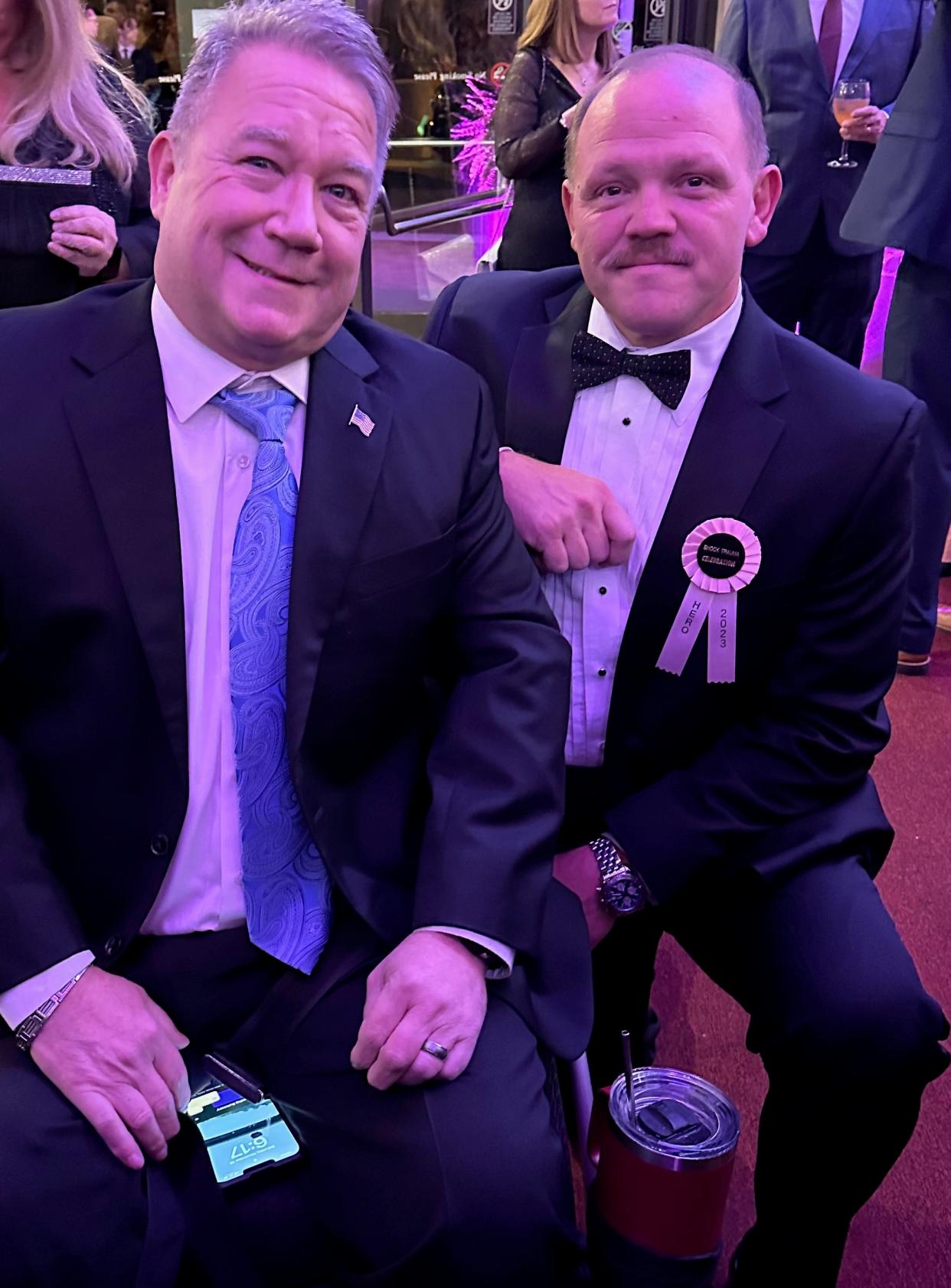
"Adam making that call early on, is probably what saved his life," said Keli Smith. "There was very limited what we could do for him, he needed a surgeon."
Boonsboro Deputy Fire Chief George Meyer said he arrived about the same time as the fire engine with Carrier and the others, and the ambulance from Brunswick Volunteer Ambulance & Rescue Co. with Frederick County personnel.
Keli Smith would soon arrive on scene as well. Smith had finished training and said she was talking to her boss, Kevin Lewis, at the Sharpsburg fire hall when the call came in. Knowing the area, Smith drove them both to the scene.
Meyer said a motorcycle was off the side of the road in the grass. Close by was Spitnale, lying in the grass with "bad" injuries.
Meyer said he established incident command, also requested air medical and reported Spitnale was category 1A, the most life-threatening trauma designation.
According to Meyer, Smith and Chisholm, who reviewed the case notes, Spitnale had severe injuries to his lower extremities and a dangerously low blood pressure.
His blood pressure was so low there was concern Spitnale could go into multisystem organ failure, Smith said.
He also had a ruptured diaphragm, meaning abdominal organs were migrating to his chest and putting pressure on his heart so it wasn't squeezing effectively, Smith said. The potassium building up from a major leg injury also was hampering blood circulation.
Smith, a paramedic, said she couldn't intubate Spitnale because he was far sicker than anticipated, so she and other medical personnel did what they could. Spitnale was given fluids through IVs and they prepared tourniquets.
EMS workers put a pelvic binder on Spitnale to hold his pelvis together, because it also was "pretty mangled," Smith said.
"The biggest thing with us, for him, was a really, really good assessment to map out potential injuries," Smith said.
Smith said they also realized Spitnale had no sensation in some spots, meaning he had some type of spinal cord injury.
Once the medevac crested over the mountain, Smith gave the flight medics a "full lowdown" on what they had, what they were thinking and doing, and what they needed from the medevac.
Carrier said he told the medevac to land close behind the ambulance.
And it did.
Smith described it as "one of the closest landings I've seen," about 50 yards away.
Meanwhile Laura Spitnale had arrived on scene after being called by one of the witnesses.
In the back of the ambulance, Smith said she, Carrier and the flight medic decided to give Laura some time with her husband, to "give them a moment," because the EMS workers knew how "grim and grave his injuries were."
That moment, which Smith described as roughly 2 minutes, would either give Scott "whatever he needs to make it through these next 20 minutes (on the medevac journey) or not rob them of the last 2 minutes they have" with Scott still conscious, Smith said.
So while EMS workers took Scott on a gurney from the amblance to the medevac, throwing equipment into the helicopter, Laura and Scott had a brief moment.
Scott said he was in shock, "in and out" and doesn't remember much of it.
For Laura, what she remembers being more like 30 seconds "meant the world to me."
Laura remembered Scott's face being "gray, very scary." His head was strapped down so he couldn't move to look at her. "I just kept saying, 'I love you honey. ... Everything's going to be OK. I'll meet you at the hospital. They're going to take great care of you.'"
"I literally just stood in the middle of the road and prayed and waited for them to fly away," Laura said.
'Round-the-clock surgeries' at Shock Trauma
The paramedics on state police medevacs "are among the most highly trained" anywhere and got Scott to Shock Trauma alive, said Efron, the trauma chief at the Baltimore hospital.
At Shock Trauma, procedures were done to keep Scott alive and help him "tolerate an operation," Efron said.
That included a massive blood transfusion.
Efron said he didn't remember how many units of blood Scott received, but that he had a number of places where he'd lost a great deal of blood, including a pelvic fracture that tore an artery.
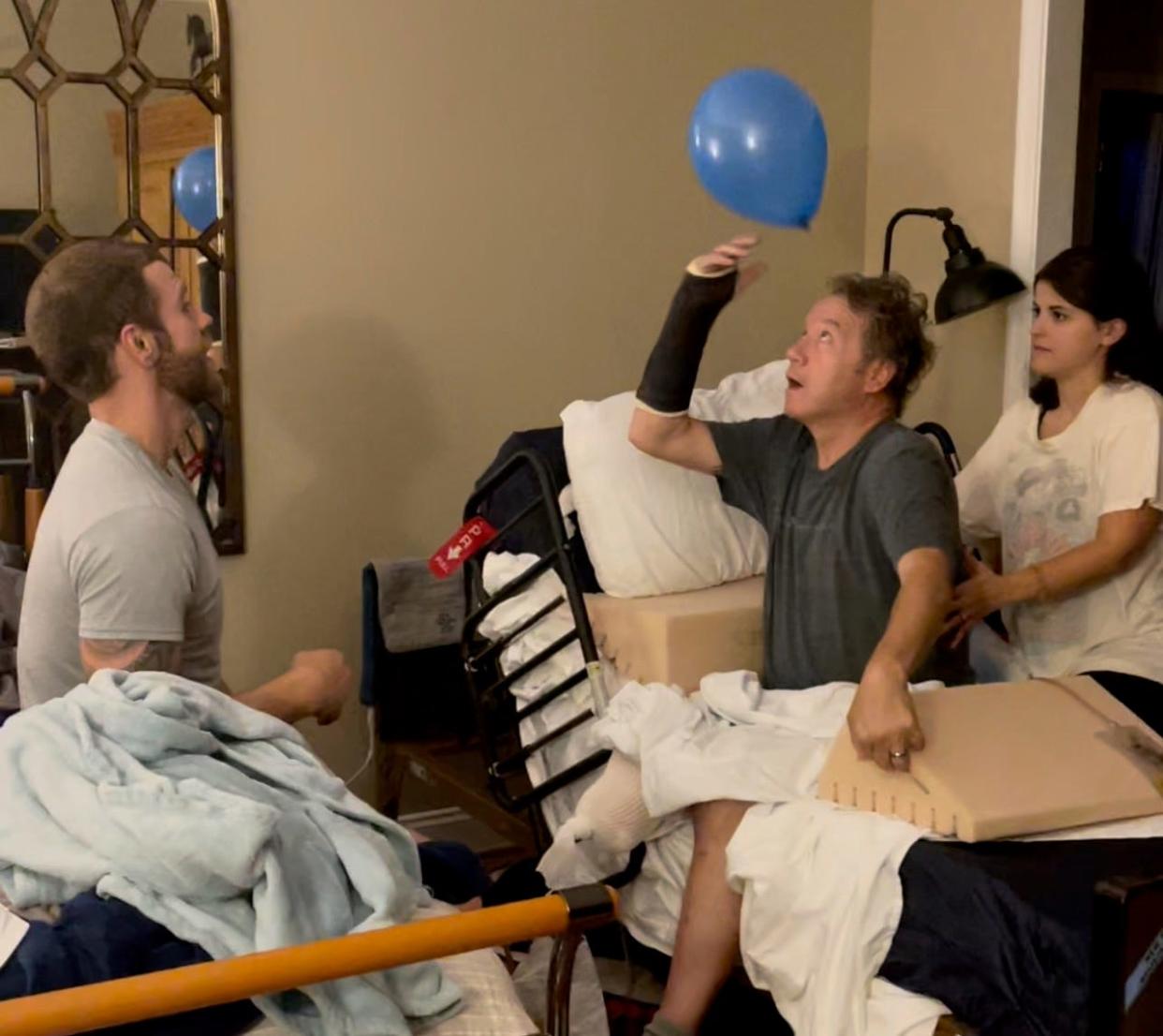
Starting this past spring, state police medevacs carry blood, Efron said. That wasn't the case at the time of Scott's injuries or he definitely would have received a transfusion during the flight to Shock Trauma, Efron said.
A resuscitative endovascular balloon occlusion also was performed, putting a balloon in Scott's aorta to control blood loss, Efron said. It's not a common procedure, but at Shock Trauma it's done about 50 times a year, he said. The move buys time to get the patient to the operating room.
Sadly, Efron said, the Shock Trauma team encounters injuries like Scott's every day, taking care of 7,000 trauma patients a year. There is a 95% survival rate, according to a Shock Trauma news release.
"The team is well rehearsed," Efron said.
Laura recalls Scott having "round-the-clock surgeries" the first six days. In addition to paralysis, a ruptured diaphragm and needing part of his right leg amputated, Scott had numerous broken bones.
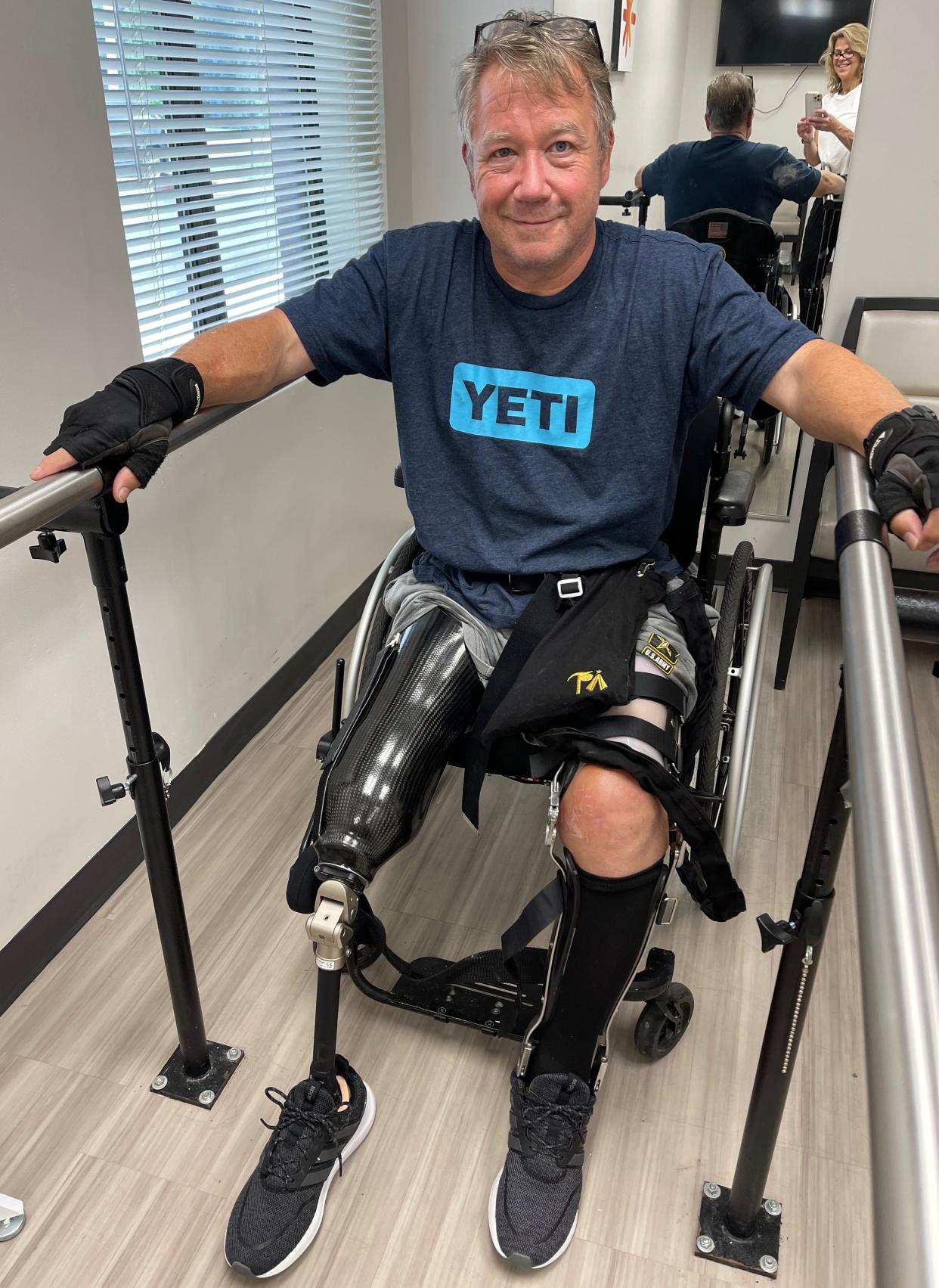
Even now, more than two years later, Scott says he still has at least a few more surgeries to go.
He first came home in August 2021, but it was around November that year that Scott said he first felt like he was home.
At that point, the external fixator — a cagelike device on his right arm — had been removed so he could use the arm again and he was cleared for weight-bearing therapy.
The couple said they have become lifelong friends with some of the doctors from the university's rehab program. Some of them visited the Spitnale's home to make sure he could transfer OK from his wheelchair to his bed or another chair.
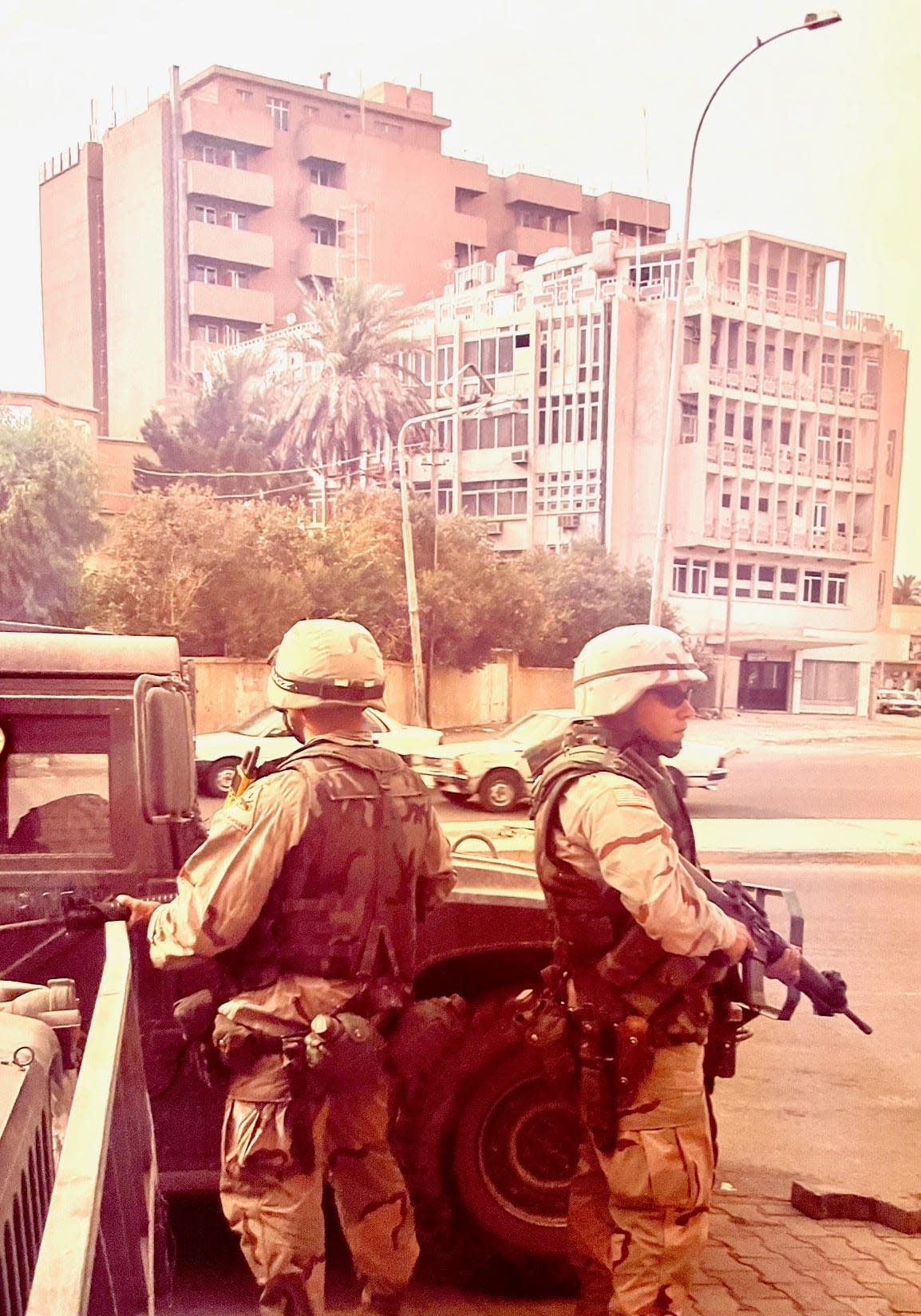
Adjustments to home and life for the former Army Green Beret
While Scott was at Shock Trauma, his stepson, Grant Taylor, worked with contractors to make accommodations at the house. Those included installing a ramp and a custom stair chair Scott's U.S. Special Forces team got for him.
Scott served with the Army's Special Forces, now known as Special Operations and formerly known as the Green Berets, for 22 years. He earned a Bronze Star for heroism for saving some of the soldiers on his team in 2004 while in Baghdad, he said. He was stationed there in wartime, during Operation Iraqi Freedom.
Scott's colleagues at Homeland Security donated thousands of hours of leave time while he recovered for two years. He began remote work this spring. Laura went on leave from her Homeland Security job to care for Scott and recently retired.
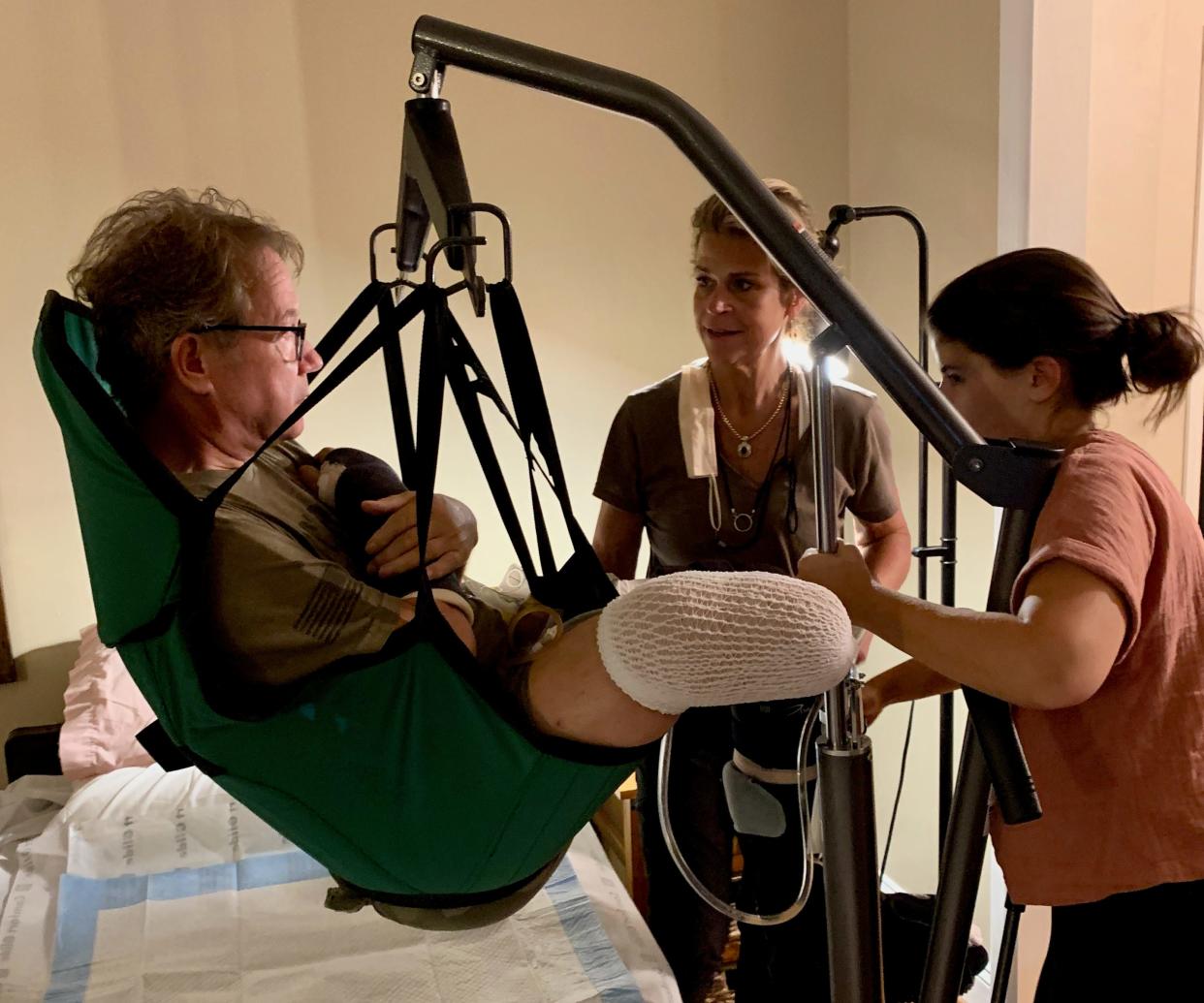
"It's a lot," Laura said. There wasn't a second she wasn't "all in," but "you don't realize what your reality, your new reality is going to be. ... It's been very life changing." Of all her new tasks, including taking care of Scott's personal needs, taking out the trash is the thing she hates the most, she said.
Taylor quit his new job as an events coordinator to help Scott and became a personal trainer. He opened his own personal training and wellness coaching business, Find Your Grit, based in Potomac, Md., Laura said.
Taylor's wife, Brenna Mauro, is an occupational therapist. After working her regular shift, she helped Scott with his therapy.
The younger couple moved in for about 10 months to help Scott and Laura.
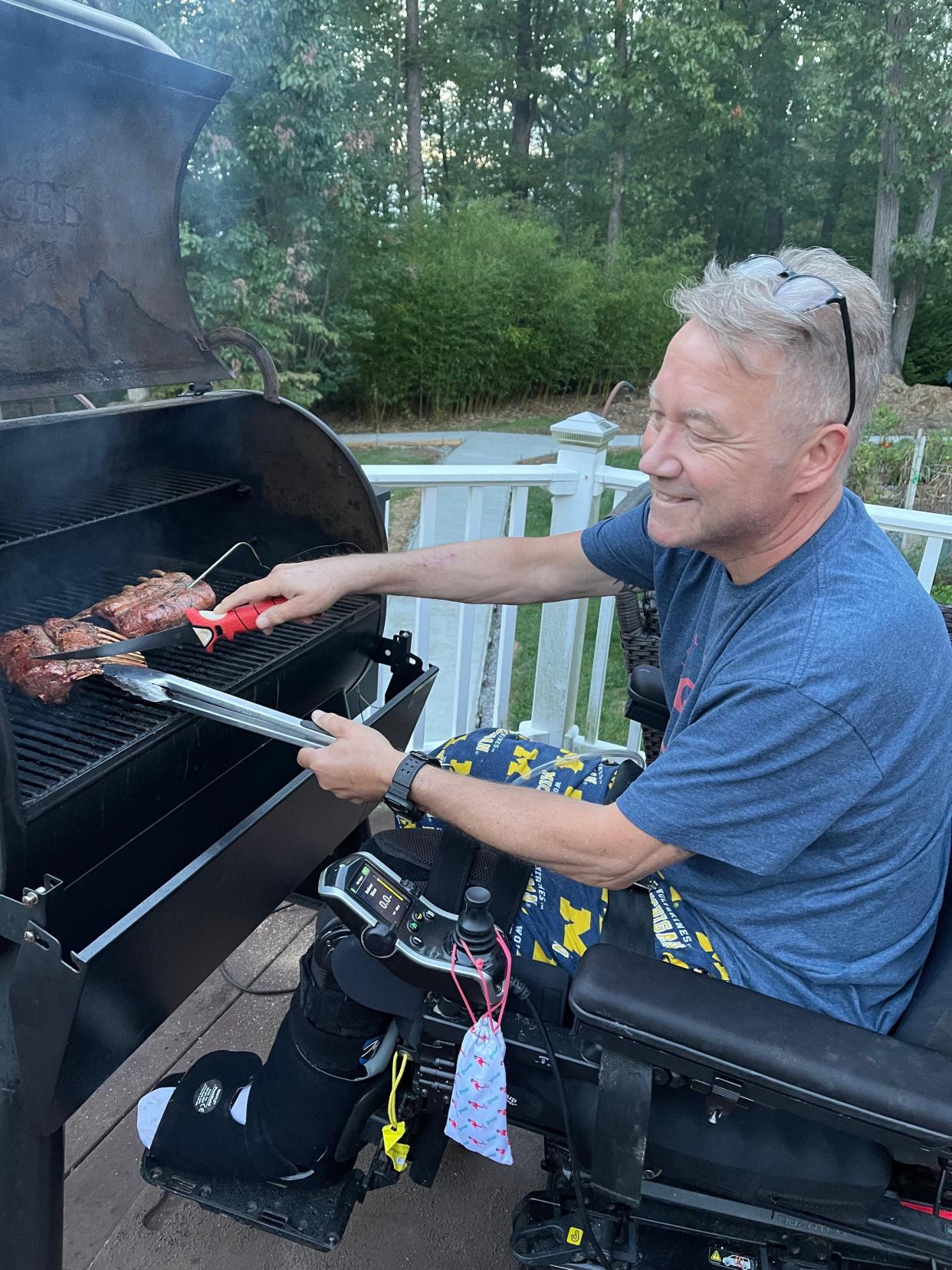
And Scott? In addition to working, he still loves grilling. A friend brought him a mini version of the grill he already had, one that is the same height as his wheelchair.
He also loves cycling with his hand cycle and mowing. Yes, mowing.
They got a zero-turn mower with all hand controls that he can transfer onto from his wheelchair.
"I get strapped in. Get my headphones on and I’m gone. The only thing that stops me from mowing grass is running out of gas," Scott said.
Efron said there's no question Scott is a "special person."
"This is an incredible change for him. And so his approach to his recovery, it puts me in awe," he said.
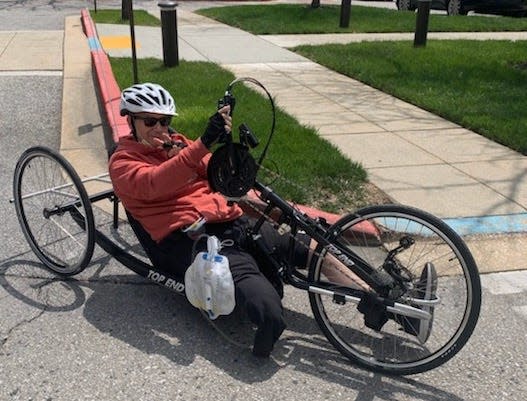
This article originally appeared on The Herald-Mail: Keedysville man thanks Shock Trauma, EMS workers for saving his life
